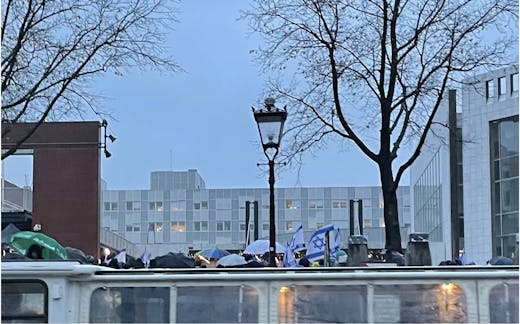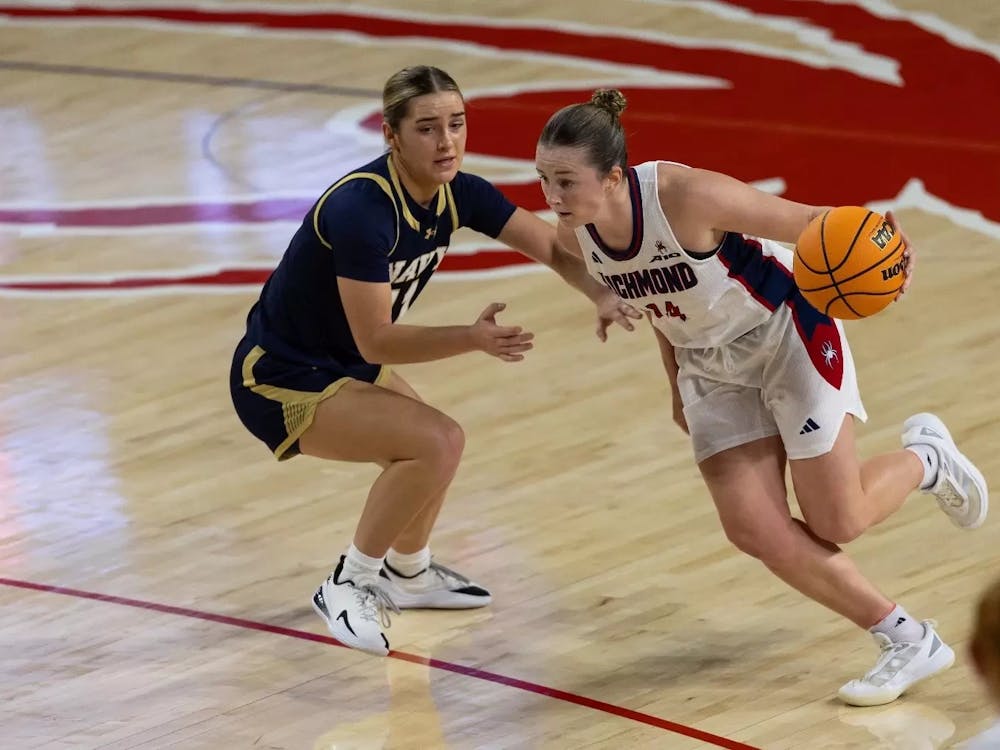Editor's note: The views and opinions expressed in this article do not reflect those of The Collegian.
The United States can often feel like a bubble from the rest of the world. Being in North America, we are separated by an entire ocean from the issues overseas. As a journalism and English major, I try to read and follow the news as much as possible. But when I walk around Richmond’s campus, it can sometimes feel like the issues our world faces are much farther away than they really are. I’ve often heard students discuss the “Richmond bubble,” and considering the University of Richmond’s size, that bubble can feel pretty small.
My semester in London has felt like the complete opposite of living in a bubble. You can quite literally feel the political tension in the air. Propaganda for centuries has played a vital role in times of war but it has truly been a different experience to witness war propaganda with my own eyes. Whether it's when I am making my commute to school on the tube and see pro-Palestine stickers on the train or while walking to get a coffee and seeing missing person posters of Israeli hostages posted on the sides of buildings.

In front of the Chancery Lane tube station.
These posters in particular have stuck with me. There were some posters with images of children, women and men with a visual description underneath. Some posters were made by relatives of these people and were asking for information on them and to bring them home. After seeing these posters for a few days in a row on the same wall, I noticed that someone had ripped all of them down, leaving nothing but leftover tape and illegible words in the corner of the papers.
Since Oct. 7, there has not been a single day where I haven’t seen or heard some type of war propaganda in the streets. And besides the Israeli hostage posters, all of the propaganda I have seen in London has been pro-Palestine.
Most of my friends are studying abroad in different cities across Europe. I had friends in Paris, Barcelona and London all texting me asking if I was planning on leaving my housing accommodation on Oct. 13 after Hamas's former chief called on Muslims for a “Day of Reckoning.” My study abroad program sent out an email on Oct. 12 asking students to avoid attending protests.
My program is located in Central London and is within a mile radius of major universities like King's College and the London School of Economics. On Nov. 9 I passed a large group of students in front of King's College having a pro-Palestine protest of their own. One person was speaking while the students around them listened and cheered. As I walked by there were multiple students on the outside of the crowd standing in front of academic buildings, watching and having discussions about their thoughts on the conflict.
On Nov. 11, the biggest protest since the start of the war took place in London with over 300,000 taking to the streets in support of Palestinian lives. The media coverage on this day was huge because the protest fell on Armistice Day, which marks the end of World War I and honors those killed in the war. This march was seen as very controversial by the British government, with the government going as far as to try and get the march banned.
I had a very different experience in Amsterdam, however, seeing both pro-Palestine and pro-Israeli protests within a few hours of each other as I walked around the city. On the weekend of Oct. 18 while on a canal tour, my boat was rerouted to East Amsterdam due to the size of the Pro-Palestine and Pro-Israeli protests that were happening simultaneously. The protests were also taking place on the canal waterways as well as land. As our boat passed by the protest you could see police boats with their lights on.
Enjoy what you're reading?
Signup for our newsletter

Pro-Israeli protest in Amsterdam.

One man on his boat displaying the Israeli flag.
While passing a pro-Palestine protest, I could see a large crowd of people carrying umbrellas depicting the State of Palestine flag on it as it was pouring rain. One girl who looked about 20 years old was speaking into a megaphone saying, “If you are a humanitarian and care about the lives of innocent civilians you will join us now,” as she tried to recruit more people to join the march.
According to Reuters, there have been “408 antisemitic incidents'' and “174 Islamophobic offenses” in London in October alone. The number of Islamophobic and antisemitic incidents doubled the week of Oct. 27 compared to a week earlier. In October 2022, just last year, those numbers had been as low as 28 antisemitic incidents and 65 Islamophobic offenses.
As of Nov. 22, Israel and Hamas have agreed to a temporary ceasefire to release hostages. My hope and the hope of many is that this ceasefire will play out in the most efficient and safely possible. It will be interesting to see how or if this ceasefire will affect the tone in London and other cities abroad at all.
Contact contributing writer Bettina Johnston at bettina.johnston@richmond.edu.
Support independent student media
You can make a tax-deductible donation by clicking the button below, which takes you to our secure PayPal account. The page is set up to receive contributions in whatever amount you designate. We look forward to using the money we raise to further our mission of providing honest and accurate information to students, faculty, staff, alumni and others in the general public.
Donate Now



